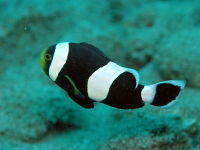Difference between revisions of "Amphiprion polymnus"
From The Aquarium Wiki
m |
(I just lost my Amphiprion polymnus after 12 years) (Tag: Visual edit) |
||
| (One intermediate revision by one other user not shown) | |||
| Line 2: | Line 2: | ||
|stub=Yes | |stub=Yes | ||
|name=Saddleback Clownfish | |name=Saddleback Clownfish | ||
| − | |extra_common_names=Twobanded Anemonefish, Saddleback Clownfish, Brown Saddle Clownfish, Panda Clownfish, White-Tipped Anemonefish, Yellow-Finned Anemonefish | + | |extra_common_names=Twobanded Anemonefish, Saddleback Clownfish, Brown Saddle Clownfish, Saddleback Anemonefish, Panda Clownfish, White-Tipped Anemonefish, Yellow-Finned Anemonefish |
|species=Amphiprion polymnus | |species=Amphiprion polymnus | ||
|extra_scientific_names=Amphiprion bifasciatus, Amphiprion bifasciatus annamensis, Amphiprion intermedius, Amphiprion laticlavius, Amphiprion polynemus, Amphiprion trifasciatus, Amphiprion polymus | |extra_scientific_names=Amphiprion bifasciatus, Amphiprion bifasciatus annamensis, Amphiprion intermedius, Amphiprion laticlavius, Amphiprion polynemus, Amphiprion trifasciatus, Amphiprion polymus | ||
| Line 23: | Line 23: | ||
|food_other=Yes | |food_other=Yes | ||
|min_life_span=2 | |min_life_span=2 | ||
| − | |max_life_span= | + | |max_life_span=12 |
|min_sg=1.020 | |min_sg=1.020 | ||
|max_sg=1.025 | |max_sg=1.025 | ||
| Line 67: | Line 67: | ||
== Identification == | == Identification == | ||
:Typical oval [[:Category:Clownfish|Clownfish]] shape. The Saddleback Clownfish has an orange-brown body with a vertical white band behind its head, and a large white patch on its dorsal area which resembles a "saddle". The colouration can vary from orange to black. The pattern of white bars can also vary. A captive-bred variant was developed that lacked the distinctive "saddle" patch is called the "black saddleback clownfish". | :Typical oval [[:Category:Clownfish|Clownfish]] shape. The Saddleback Clownfish has an orange-brown body with a vertical white band behind its head, and a large white patch on its dorsal area which resembles a "saddle". The colouration can vary from orange to black. The pattern of white bars can also vary. A captive-bred variant was developed that lacked the distinctive "saddle" patch is called the "black saddleback clownfish". | ||
| − | |||
{{Categories | {{Categories | ||
Latest revision as of 14:02, 16 July 2018
Amphiprion polymnus
114 Litres (30 US G.)
12-13 cm (4.7-5.1")
8.1 - 8.5
22.2-25.6°C (72 -78 °F)
8-12 °d
1:1 M:F
2-12 years
Family
Pomacentridae
This animal is available captive bred
| You can contribute to the Aquarium Wiki by expanding this article. Dont be shy!. |
Contents
Additional names
- Twobanded Anemonefish, Saddleback Clownfish, Brown Saddle Clownfish, Saddleback Anemonefish, Panda Clownfish, White-Tipped Anemonefish, Yellow-Finned Anemonefish
Additional scientific names
- Amphiprion bifasciatus, Amphiprion bifasciatus annamensis, Amphiprion intermedius, Amphiprion laticlavius, Amphiprion polynemus, Amphiprion trifasciatus, Amphiprion polymus
Origin[edit]
- Pacific ocean
Sexing[edit]
- Hard to do, as males are the same size as females
Tank compatibility[edit]
- Peaceful
Diet[edit]
- Will take most kinds of marine food including live foods such as krill and flake.
Feeding regime[edit]
- Daily
Environment specifics[edit]
- A spacious tank with hiding places is required. Known to host Stichodactyla haddoni or Heteractis crispa anemones.
Behaviour[edit]
- Mixes well with nonagressive species
Identification[edit]
- Typical oval Clownfish shape. The Saddleback Clownfish has an orange-brown body with a vertical white band behind its head, and a large white patch on its dorsal area which resembles a "saddle". The colouration can vary from orange to black. The pattern of white bars can also vary. A captive-bred variant was developed that lacked the distinctive "saddle" patch is called the "black saddleback clownfish".
Pictures[edit]
External links[edit]
- Fishbase (Mirrors:
 )
)
